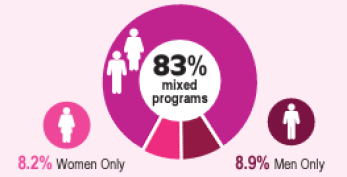

According to new research published in the journal Biological Psychiatry: Cognitive Neuro-science and Neuroimaging, compared to people without a drug problem, cocaine addicts tend to make riskier choices after losing out on a potential...
A series of reports in a supplement to the scientific journal Addiction presents the latest evidence on alcohol marketing and its impact on children. Key findings from the collection of peer-reviewed manuscripts include:
Smoking is a serious health issue worldwide. Prevalence, however, has steadily declined across Australia over the last several decades thanks to a number of successful public health campaigns. The number of smokers in the country is now...
As we welcome in the New Year it seems an ideal time to take stock and present the key points from the 2016 European Drug Report (EDR), the European Monitoring Centre for Drug and Addiction’s (EMCDDA) annual review of the European drug...
The New York Times article traces the impact of America's opioid epidemic on Americans of all backgrounds throughout the country. Photos depict the human face of a tragedy that is taking too many lives.
Is the maltreatment of children linked with marijuana use later in life? Are behavioural problems and tobacco and alcohol consumption during adolescence associated with smoking marijuana?
These are questions that an Australian study...
New research has found a significant link between suicide risk and simultaneous cocaine and alcohol consumption.
The study examined the drug-taking habits of 874 participants hospitalised for displaying suicidal tendencies, ranging from...
Research has found that one’s personality is a useful predictor of drug and alcohol abuse. One notable programme that approaches substance prevention by focusing on personal characteristics is PreVenture. PreVenture has already been shown...
Residential ‘in-patient’ treatment for substance abuse – more commonly known as ‘rehab’ - is the favoured option among those wanting to recover from addiction.
The rate of relapse within the first year following being discharged, however...
According to new findings published in the journal Tobacco Control, more than 53 million people in 88 countries have stopped smoking between 2008 – 2014 because of tobacco control measures.
Statistically, this means that during the 4...
A new study suggests that Londoners consume the most cocaine during the week. However, it was also found that, when weekends were taken into account, the Belgian city of Antwerp overtook the UK’s capital for cocaine consumption. The results...
A news item currently trending in the French press concerns the alarming increase in consumption amongst French teenagers of a drink most commonly known as ‘purple drank’, but also referred to as ‘lean’ or ‘sizzurp’. Le Monde first reported...
We are in the middle of the first quarter of the 21st century. It is a technologically advanced era, in which people across the world, and within a country are trying to excel in their lives, exploring new opportunities and trying to build...
In its latest Smoke-Free Movies Report, the World Health Organisation (WHO) advised governments that films featuring tobacco use ought to be classified for their adult content. Published in the journal Tobacco Control, a new study supports...
A new study suggests that the way in which the human brain responds to nicotine depends on what a smoker believes about the drug’s content in a cigarette. The investigation found that smoking a cigarette that contains nicotine, but thinking...
New research suggests that certain personality traits, such as having a lack of restraint or being impulsive, increase the likelihood of developing alcohol use disorders. On the flip side, the study found that people with high resilience...
A collaborative research project geared towards understanding the patterns of use, motives and harms of New Psychoactive Substances (NPS) - commonly referred to as ‘Legal Highs’ - in Scotland has recently published its findings. Amongst the...
Younger people consider flavoured variations of tobacco products, for example, cigarettes and e-cigarettes less harmful and more appealing, according to a recent study conducted by researchers at the University of North Carolina Lineberger...
A new study carried out at the Case Western Reserve University School of Medicine has found that results from drug and alcohol addiction treatment programmes improve amongst teens when they stop smoking. The findings, which have been...
Share the Knowledge: ISSUP members can post in the Knowledge Share – Sign in or become a member